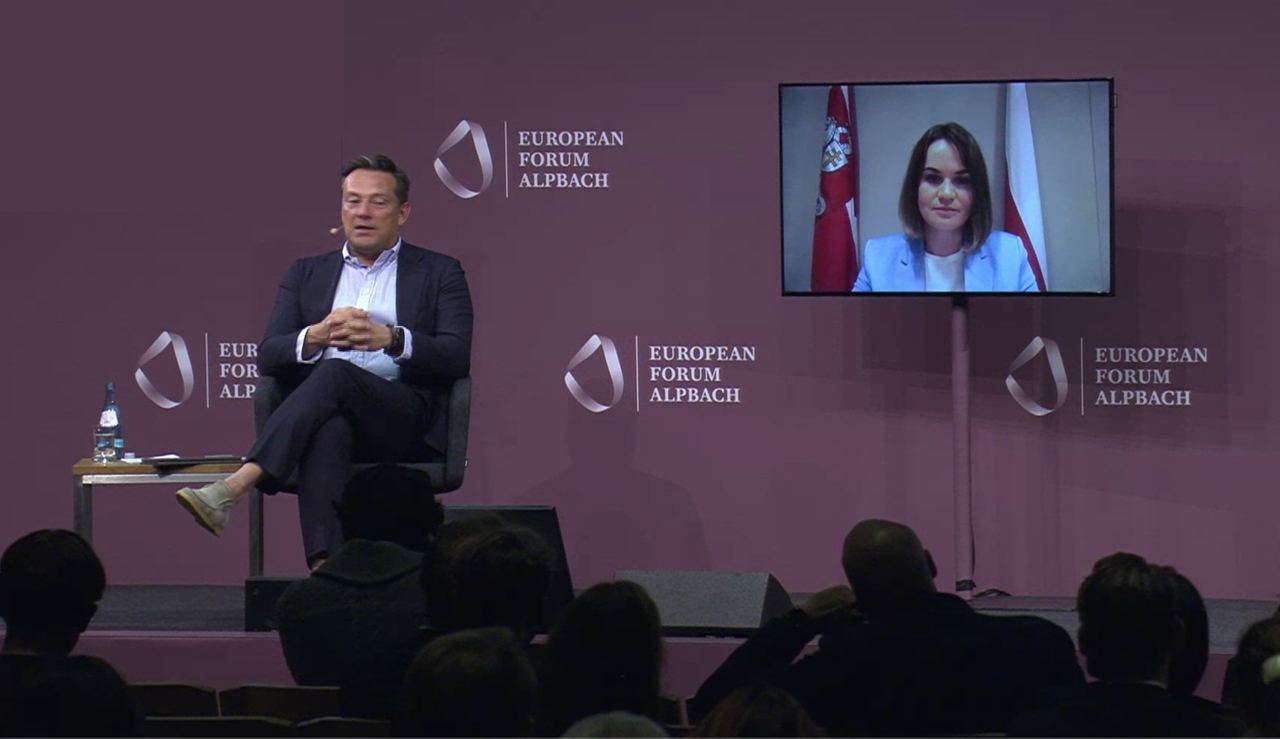“Dear ladies, and gentlemen, dear friends,
I am honored to take part in today's discussion. I’m speaking here on behalf of millions of Belarusians who have been fighting for democracy for more than a year already. It has been a challenging year, but our nation learned that the path to democracy is complex and requires a lot of patience, diligence, and courage.
Today at this session, we are going to talk about reshaping politics in the modern world. But what does the word "politics" even mean? It is not understood the same way in democratic and authoritarian countries. I was born when my country was not even authoritarian, but a totalitarian one, and my generation was not the first that lived in such a system. I was nine years old when the Soviet Union collapsed, and Belarus restored its independence. Many Belarusians hoped for a better future, but many others were too afraid of that future and wanted to reverse time or at least slow it down. This is why such a populist as Aliaksandr Lukashenka managed to gain power and establish a dictatorship. I grew up in this strange post-Soviet Belarus, stuck between past and future.
So, what did the word "politics" mean back then, from the nineties up to 2020? It meant "the state". And "the state" meant "the president". The dictator considered himself the only “true” politician in Belarus — the one who takes decisions and makes plans. "Politics" was believed to be either dirty or dangerous. Of course, there was always resistance, but it consequently failed to become a political force. During the years, the opposition was reduced to informal movements. Belarus was a country without true mayors, without true parties, without true parliament.
It was also a country without real elections. So when last year the presidential campaign began, many were confused about it. Once in five years, Belarusian citizens can make a political act and go to vote. But why should one do it if the results will be falsified anyways? Shouldn’t we boycott it? And what if the dictator just reelects himself for the sixth time?
I was pondering about this, as were all other Belarusians. But at that very time, we saw that we are not alone. Paradoxically, the COVID-19 pandemic made us reach out to each other. The volunteers showed that Belarusians could self-organize quickly and effectively. Then several brave people decided to run for president, and one of them was my husband, Siarhei Tsikhanouski. After he declared his decision, our lives changed drastically. He was arrested and I took his place on the ballot. We created a coalition with the other teams. We managed to unite all kinds of supporters: the capital and the regions, businessmen and factory workers, those with decades of political experience, and the newcomers. We remembered that we are all Belarusian citizens and that we have the right to decide the future of our country. We finally believed that we could win. And we did.
Nevertheless, ex-president Lukashenka refused to leave the office and started to terrorize the whole country. With thousands in prisons and tens of thousands forced to leave the country, last year was the most difficult one for Belarus since World War Two. And it still is…
Recently the regime's violence started to spread internationally with the hijacking of the Athens-Vilnius airplane and the artificial migrant crisis. One may ask — was it worth it?
It is not easy for me to say, but I will answer: Yes, it was. We broke out of the vicious circle and returned to history. Now the word "politics" means for us what it should mean — the responsibility of the citizens towards each other. Meanwhile, the regime refused the political means and resorted to terrorism. All its violence is only a reaction to the activity of society. The regime is driven by fear, and this is why it has no future.
However, the story is not over. We do not know what sacrifices we still have to make to realize our victory. Belarusians now know that it is easy to destroy democracy, but it is hard to rebuild it. We see how fragile and precious it is.
A year ago, Belarusians learned how brave and daring we are. And we have also learned that we are not alone in our fight for freedom and dignity. The whole world is with us.
Therefore, I continue to call all the democratic world for solidarity and support for Belarus. On the one hand, I call on you to help those who suffer from the regime and are at the forefront of our struggle, and on the other – to maximize the pressure on the regime to force it to release political prisoners in Belarus, stop violence and repressions, and start a dialogue leading to a new presidential election under international observation.
I hope that the peaceful resistance of Belarusians can inspire people around the globe to value democracy where they have it and fight for it where they lack it.
Thank you for your attention!”.








